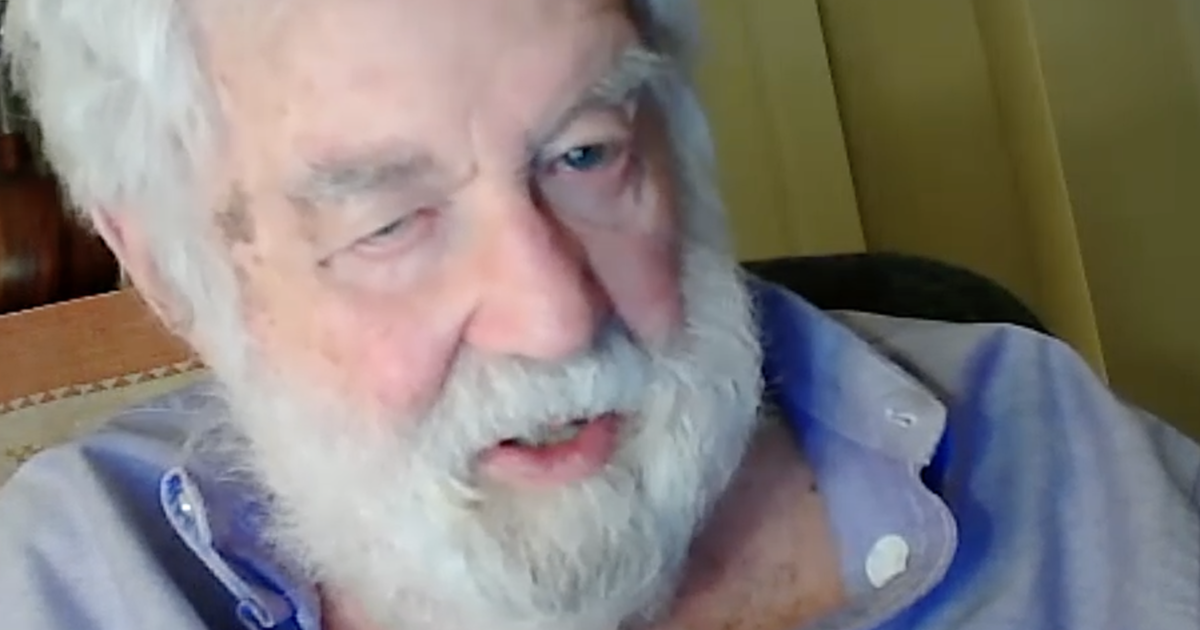CBS News
As a boy he survived the Holocaust — then fell in love with the daughter of a Nazi soldier. They’ve been married 69 years.

In the weeks before Valentine’s Day, CBS News will feature three stories about love that has not only survived but thrived despite daunting challenges. We call this series Love, Against All Odds.
On Saturday, Jan. 27, Werner and Martha Salinger celebrate their 69th wedding anniversary — a quiet moment to honor the determination that has kept their marriage together for so many decades. The couple hasn’t gone out much since they moved into an assisted living home in Wayland, Massachusetts, as Martha, 90, suffers from arthritis and is in a wheelchair, and her husband with great care tends to her needs.
It was a union some predicted wouldn’t last — but it endured, the 92-year-old Salinger said, in part to heal “the results of the Holocaust in Nazi Germany.”
As a boy, Salinger escaped the genocide. He returned to Germany as a young adult and fell in love with Martha, the daughter of a Nazi soldier. Their anniversary, Jan. 27, happens to coincide with International Holocaust Remembrance Day.
Their story is based on love, “and respect for each other’s opinions and beliefs” — and how it can survive, against all odds.
“I never saw my mother again”
He remembers mostly a happy childhood in Berlin, Germany — until Kristallnacht, when Nazi-organized anti-Jewish riots destroyed homes and businesses overnight starting Nov. 9, 1938. An only child, Werner Salinger lived a comfortable life in the city’s center. His mother, an orthodontist, had a practice in their apartment, and his father was an attorney specializing in labor law.
Across the street were upscale stores owned by Jewish proprietors, and Salinger, then 6 years old, said he vividly remembers “glass shards on the streets and bodies in the street” that night and “acrid smoke rising from the synagogue” just a block away.
Getty Images (Historical)
Just over a year later, on Jan. 12, 1939, Salinger and his family left Germany, arriving in New York two months later.
Three and a half hours south in Hof, a mid-sized German city not far from the Czech border, Martha lived with her four siblings and parents. Her father worked for the German tax authority, she said and joined the Nazi party when he was told he would lose his job if he didn’t.
He was sent to fight in France and then Russia, Martha said, and then when the war ended he came home “and he was never the same person again.” The war ended when Martha was 12 years old and she remembers there “not being enough to eat.” She worked at a department store that used to be owned by a Jewish family; her mother said they went to America.
Meanwhile, the Salinger family’s troubles were not over. Werner’s mother contracted tuberculosis on the ship to America and died a few months later. “The last time we saw each other was the day after my 7th birthday, and then I never saw my mother again,” he said. “I never got to say goodbye.”
Werner Salinger
He was sent to live with relatives in Princeton, New Jersey — just a few blocks from Albert Einstein, whom he remembers playing the violin — while his father got back on his feet.
Einstein loved children, Salinger said, and when they visited his home he used to take him by the hand and walk him through his garden, “which was a beautiful garden.” Einstein would then walk back to his studio, take his violin off his wall and “then play it for me.”
Salinger would take the train from Princeton to New York City to meet up with his father. Eventually, his father got a job in medical supplies sales, remarried another German Jewish refugee and moved to Baltimore. Salinger joined him in Baltimore through high school and some college, until the Korean War began in 1950. Salinger enlisted in the Air Force, and “that’s when I headed back to Germany.”
“Cupid came along”
Fluent in German, Salinger was sent to the country, where he collected intelligence from 1951 to 1955.
It was just six years after the end of World War II.
As the Soviet Union and America entered the Cold War, the Soviet Union sent the many German prisoners of war captured during World War II back to Germany. Salinger was sent to interview the former POWs, who had spent years in the Soviet Union and knew copious amounts of information. “When the supply of German POWs ran out,” he said, he would “interview defectors.”
Assigned to a unit in Hof, Salinger worked alongside German soldiers who might have had a past in the Nazi party. “I wondered what I was doing there. I was apprehensive about meeting Germans, especially men who had worked in the S.S. or other places.”
The work was intense, however, and Salinger said he soon developed friendships with Germans: “The collegial work and friendships developed were more important than the history.”
Salinger had a 1938 Plymouth car, and at the time he was stationed in Beyruth, a town 40 minutes from Hof, and would drive up to Hof a few times a week — especially on a Saturday, when everyone would gather at a castle in the middle of the city to dance.
He was looking for a pretty German woman he could travel around Europe with — then “Cupid came along.” That’s where he met Martha.
Martha remembers seeing a young man in a suit, who spoke fluent German but had a crew cut — something unusual for Germans at that time.
“That’s how it all started,” he said. That night after dancing, he drove her and a girlfriend home. He asked her for a date the next day.
“He was very persistent,” Martha recalled, and she said the “romance was exciting.”
They quickly fell in love. American soldiers weren’t allowed to marry German women until two weeks before their tour of duty ended. At that time, Salinger said, he didn’t think much about it, because he had at least a few years left in his service — but “as they fell deeply in love,” they wanted to marry.
He didn’t tell Martha he was Jewish at first. “I’m going to have something to tell you something you might not like — it might break this relationship apart,” he remembers finally saying.
Martha said he was so worried to tell her that she knew it could only be because he was Jewish. She recalled he said to her, “I’m going to tell you something and you’re not going to love me any longer.”
She wasn’t bothered though by the news, she said, nor was her family. Martha said her family was very liberal and her father joined the Nazi party because he was forced to‚ not because he hated Jews. She wasn’t surprised Werner was Jewish and says it “wasn’t a deal-breaker.” Werner said he never viewed his wife’s family as Nazis — and “they just accepted me as their son-in-law.” It was not an issue for them or Martha.
His father-in-law was a decent human being, said Salinger: “I love him and he loved me.” Clergy tried to dissuade them from marrying, but Martha got pregnant, making nuptials urgent.
Werner said he felt very strongly he had to go back to Baltimore and face his family. They knew he had a girlfriend in Germany he was serious about, but they didn’t know he wanted to get married. Martha was more worried about the reaction of Werner’s family to her history. He said he told his father and stepmother, “You can either choose to accept Martha or not, but if not, it’s your loss.”
Create a family and keep it together
The first year was a testy one, said Werner. Martha arrived in the United States in August 1955, a few months after their marriage. The couple rented a small apartment in Langley Park, Maryland, the first year. Martha didn’t speak any English, and says, “I was very worried whenever someone came up the stairs because I would have to talk to them.” She said she learned the language because her “husband was a good teacher.” Every day she would write down in English what she did for the day, and then Werner would review the writing and words with her.
The couple moved to Albany, New York, where they purchased their first home for $15,000 on a Veteran’s Administration loan. They invited their parents to stay with them that Christmas. His stepmother sent a letter saying she wouldn’t go to a house with a Christmas tree.
His stepmother came from a religious Jewish family and her parents, who survived the Theresienstadt and Dachau concentration camps, lived with Werner during his high school years.
Werner wrote a strongly worded letter, reminding his father he was an only child, and that they would have no other grandchildren. The following year, he said, his parents surprised them at their house for Christmas. Werner and Martha also celebrated the Jewish holidays, but since they both weren’t religious, they decided to join the Unitarian community. “We choose our own religion,” Martha said.
They went on to have four children: three daughters and one son. The children didn’t respond to requests from CBS News for interviews. They also have six grandchildren and five great-grandchildren, with another soon expected.
Werner worked for most of his career in international development and often traveled to Central America to work with the communities. After many years working in computers and raising her children, Martha bought a store in Rockport, which she ran for 14 years, Werner said, and every night “she had a home-cooked meal” on the table.
For Werner, as he’s grown older he’s gotten more involved in Jewish causes, and his parents’ advice echoes strongly in his successful marriage. His father once told him, “the most important thing in anyone’s life is creating a family and keeping it together.”
And that’s what they’ve done, decade after decade — keeping that advice in mind because, Werner said, he knew just how quickly one can lose their family. He feels his mother, whom he said he misses terribly, “would be extremely proud of the life I have lived.”
CBS News
The Uplift: Photos from Helene

Watch CBS News
Be the first to know
Get browser notifications for breaking news, live events, and exclusive reporting.
CBS News
Eye on America: Chef teaches kids healthy recipes, and examining the “sandwich generation”

Watch CBS News
Be the first to know
Get browser notifications for breaking news, live events, and exclusive reporting.
CBS News
Gunfire strikes Southwest plane on tarmac of Dallas airport, officials say

There were no injuries after a Southwest flight carrying passengers was struck by gunfire on the tarmac of Dallas Love Field Friday night, authorities said.
Southwest Airlines Flight 2494 was preparing for departure to Indianapolis when “a bullet apparently struck the right side of the aircraft under the flight deck,” a Southwest spokesperson told CBS News in a statement.
The airline said no one was hurt. A spokesperson for Dallas Love Field said in an email that the aircraft returned to its gate after sustaining damage from a “security incident” and the passengers deplaned. The runway was also temporarily closed, but has since reopened.
Dallas police confirmed the incident, saying that officers responded to reports of gunfire at 9:48 p.m. local time, arriving to find that the aircraft had been struck.
No further details were provided on the circumstances of the incident or what was the potential source of the gunfire. It’s unclear how many people were aboard the jet at the time, or how much damage the aircraft sustained.
In its own statement provided to CBS News, the Federal Aviation Administration said that the plane “was reportedly struck by gunfire near the cockpit.”
Dallas police are leading the investigation into the incident.
Earlier this week, gunfire amid ongoing gang violence struck three planes that were either landing or departing Haiti’s capital of Port-au-Prince. The shootings prompted the FAA to issue a 30-day ban on U.S. airlines flying to Haiti.










